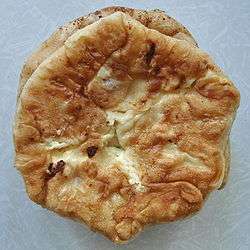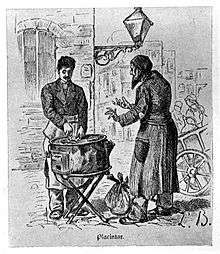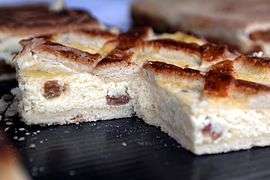Plăcintă
Plăcintă[1] (Romanian pronunciation: [pləˈtʃintə]) is a Romanian, Moldovan and Ukrainian traditional pastry resembling a thin, small round or square-shaped cake, usually filled with apples or a soft cheese such as Urdă.
 | |
| Type | Pastry |
|---|---|
| Course | Dessert |
| Region or state | Romania, Moldova, Ukraine |
| Main ingredients | soft cheese or apples |
| Variations | Placenta |
Etymology
The word plăcintă comes from Latin placenta, which means cake,[2] from the Greek plakount – "flat cake".[3]
History

As shown by the etymology of the word, the plăcintă has its origins in Ancient Rome, and dates from when Romania was a part of the Roman Empire, see Placenta cake.
Ancient Greek bakers made their bread with olive oil, herbs, and cheese. The secret of making cakes was given to the Romans during the invasion. At first there were only two varieties of cakes, called the libum and the placenta. The libum was a small cake, used as an offering to the gods.[4] As for the placenta, the Romans developed the recipe as a cake made of fine flour covered with cheese, honey, and fragrant bay leaves.[5] Ancient Roman bakers customarily prepared a large placenta which was cut into squares to be offered for sale.[6] This is the way that Romanians continue to prepare their plăcintă.
Traditional varieties of plăcintă

- plăcintă cu mere is filled with apple.
- plăcintă cu brânză is filled with sheep or cow cheese, such as telemea.
- plăcintă cu cartofi is filled with potatoes.
- plăcintă cu urdă is filled with ricotta and dill, or raisins.
- plăcintă cu ciocolată is filled with chocolate.
- plăcintă clătită (lit. "rinsed pie"), nowadays simply called clătită, is the Romanian crêpe-like variety of pancakes, also known in other East and Central European countries as the palatschinke.
See also
References
- "Definition of plăcintă" (in Romanian). DEX on line.
- "Dictionnaire Gaffiot latin-français" (in French).
- "Oxford Dictionaries".
- "Istoria cozonacului" (in Romanian). Silvana Patrascanu.
- "Mamma pizza" (in French). Le Monde.
- "Description du numéro Arkéo junior n° 31" (in French).
